A New Way To Navigate Tumblr
A new way to navigate Tumblr
If you use Tumblr on a web browser, you might have noticed us testing a brand new navigation on your dashboard in the last month. Now, after some extensive tweaks, we’ve begun rolling out this new dashboard navigation to everyone using a web browser. Welcome to the new world. It’s very like the old world, just in a different layout.
Why are we doing this? We want it to be as easy as possible for everyone to understand and explore what’s happening on Tumblr—newbies and seasoned travelers alike.

Labels over icons: When adding something new to Tumblr in the past, we’d simply add a new icon to our navigation with little further explanation. Turns out no one likes to press a button when they don’t know what it does. So now, where there’s space, the navigation includes text labels. Since adding these, we’ve noticed more of you venturing to previously unexplored corners of Tumblr. Intrepid!
What’s already been fixed? Thanks to feedback from folks during the testing phase, we’ve been able to make some improvements right out of the gate. Those include returning settings subpages (Account, Dashboard, etc.) to the right of the settings page instead of having them in an expandable item in the navigation on the left; fixing some issues with messaging windows on smaller screens; and streamlining the Account section to make it easier to get to your blogs.
What’s next? We’re looking into making a collapsible version of this navigation and improving the use of screen space for those of you with enormous screens. We’re also working on improving access to your account and sideblogs.
That’s all for now, folks. For questions and suggestions, contact Support using the “Feedback” category. Please select the “Report a bug or crash” category on the support form for technical issues. And keep an eye out for more updates here on @changes.
More Posts from A-mess-of-links and Others
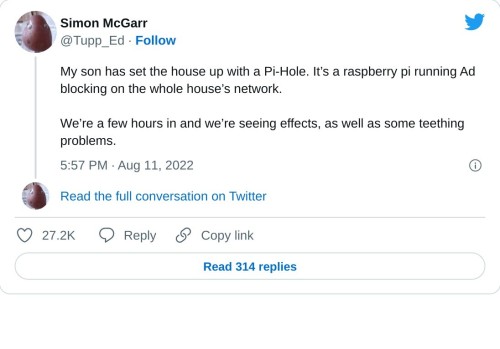
>First, we’ve discovered that about a quarter of all the internet connection in or out of the house were ad related. In a few hours, that’s about 10,000 out of 40,000 processed.
>We also discovered that every link on Twitter was blocked. This was solved by whitelisting the https://t.co domain.
>Once out browsing the Web, everything is loading pretty much instantly. It turns out most of that Page Loading malarkey we’ve been accustomed to is related to sites running auctions to sell Ad space to show you before the page loads. All gone now.
>We then found that the Samsung TV (which I really like) is very fond of yapping all about itself to Samsung HQ. All stopped now. No sign of any breakages in its function, so I’m happy enough with that.
>The primary source of distress came from the habitual Lemmings player in the house, who found they could no longer watch ads to build up their in-app gold. A workaround is being considered for this.
>The next ambition is to advance the Ad blocking so that it seamlessly removed YouTube Ads. This is the subject of ongoing research, and tinkering continues. All in all, a very successful experiment.
>Certainly this exceeds my equivalent childhood project of disassembling and assembling our rotary dial telephone. A project whose only utility was finding out how to make the phone ring when nobody was calling.
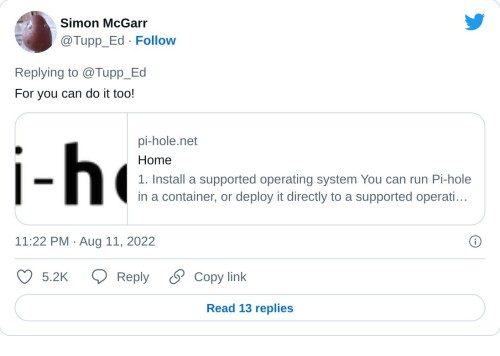
>Update: All4 on the telly appears not to have any ads any more. Goodbye Arnold Clarke!
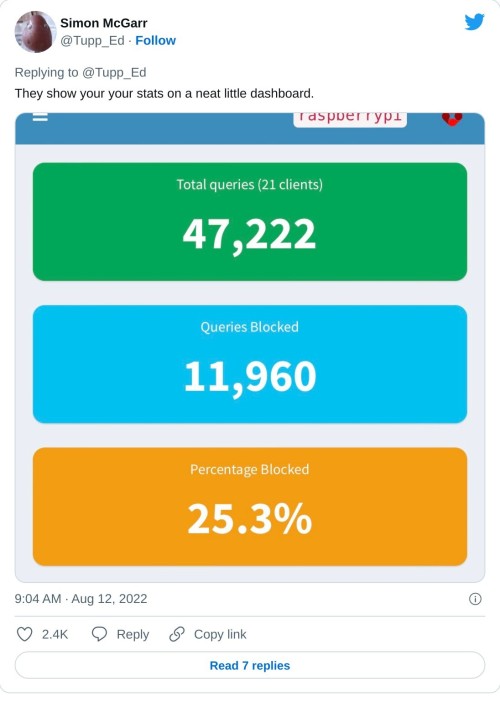
>Lemmings problem now solved.
>Can confirm, after small tests, that RTÉ Player ads are now gone and the player on the phone is now just delivering swift, ad free streams at first click.
>Some queries along the lines of “Are you not stealing the internet?” Firstly, this is my network, so I may set it up as I please (or, you know, my son can do it and I can give him a stupid thumbs up in response). But there is a wider question, based on the ads=internet model.
>I’m afraid I passed the You Wouldn’t Download A Car point back when I first installed ad-blocking plug-ins on a browser. But consider my chatty TV. Individual consumer choice is not the method of addressing pervasive commercial surveillance.
>Should I feel morally obliged not to mute the TV when the ads come on? No, this is a standing tension- a clash of interests. But I think my interest in my family not being under intrusive or covert surveillance at home is superior to the ad company’s wish to profile them.
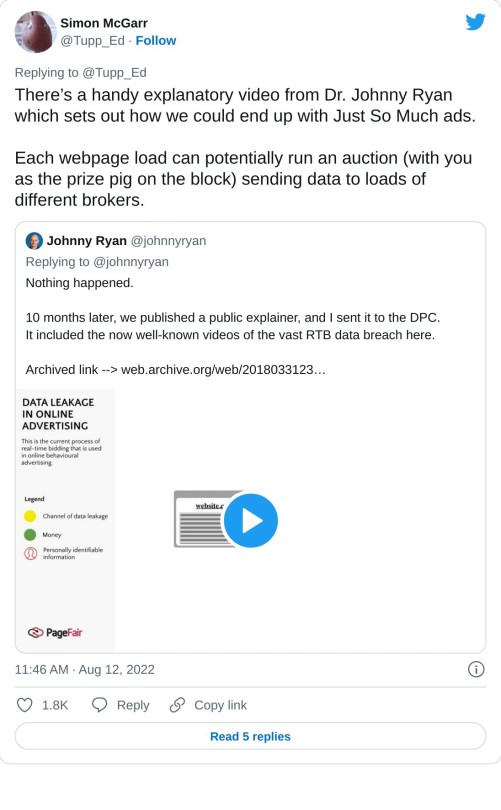
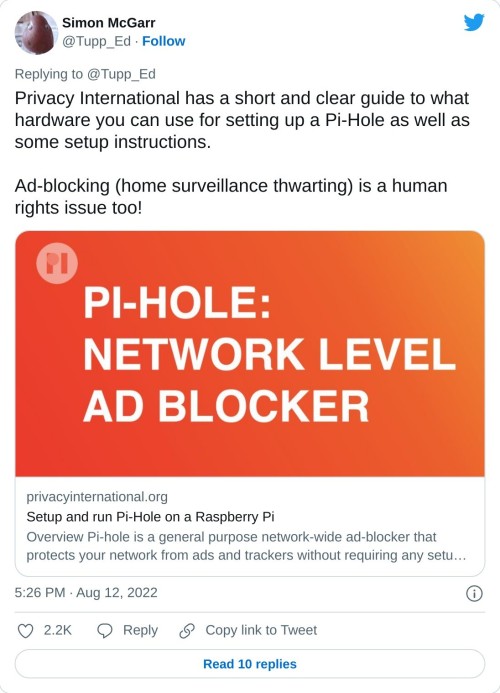
>Aside: 24 hours of Pi Hole stats suggests that Samsung TVs are very chatty. 14,170 chats a day.
>YouTube blocking seems difficult, as the ads usually come from the same domain as the videos. Haven’t tried it, but all of the content can also be delivered from a no-cookies version of the YouTube domain, which doesn’t have the ads. I have asked my son to poke at that idea.
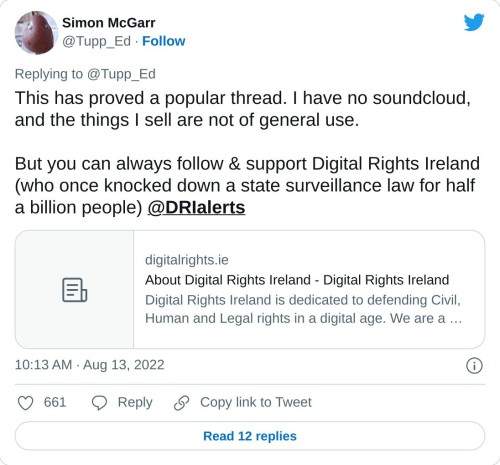
I think the hot new trends for this summer should be reading comprehension and critical thinking skills
IF YOU’RE READING THIS I NEED YOU to go to neocities.org and make an account.
It’s an emergency. Look. People are really getting into it now. Do you want to be the last kid on your block still depending on corporate social media for your self-actualization?
That’s a cute foot fetish you got there, would you mind keeping it 25796323689432 feet away from me?
VPNs do not make you more secure
here's how they work!
first of all, most of your internet traffic is already encrypted via TLS (Transport Layer Security). Things that aren't encrypted are usually videogames or less important applications.
a VPN encrypts traffic between your computer and the VPN server you're using.
your Internet Service Provider (ISP) sits in the middle of that transaction.
cue the MS paint diagram
Without a VPN:

With a VPN:

the traffic between your VPN server and the rest of the internet is not encrypted any further.
things that VPNs are good for:
bypassing geo-blocking
bypassing website blocks set up by your ISP
obscuring network traffic from your ISP
things that VPNs are not good for:
browsing the internet without having your activity logged. every company that gives internet service logs the activity, it's half of how they make sure they're not being hacked.
hiding information from the government. VPN providers WILL bend to subpoenas, they WILL turn over logs of your network activity.
cybersecurity. VPNs can't save you once the traffic is between them and the final destination. they don't analyze your traffic to detect and stop hackers, they don't add any encryption where it matters.
VPNs are not a shortcut to security. you cannot pay 15 dollars a month to forgo all responsibility for your own digital privacy. do your research, use a password manager, stay safe.
my friends i hope you find this information useful. you have been sold a lie. remember to show extreme skepticism to youtube sponsorships and journalism websites which sing their praises.
sources: i have a certificate iv in cybersecurity
-
 derpzpon3 reblogged this · 3 weeks ago
derpzpon3 reblogged this · 3 weeks ago -
 anussstart reblogged this · 1 month ago
anussstart reblogged this · 1 month ago -
 grandma-darcy reblogged this · 2 months ago
grandma-darcy reblogged this · 2 months ago -
 hotwheelswithteeth reblogged this · 2 months ago
hotwheelswithteeth reblogged this · 2 months ago -
 goob333 reblogged this · 2 months ago
goob333 reblogged this · 2 months ago -
 goob333 liked this · 2 months ago
goob333 liked this · 2 months ago -
 burntblueberrywaffles reblogged this · 2 months ago
burntblueberrywaffles reblogged this · 2 months ago -
 doofuswriter reblogged this · 2 months ago
doofuswriter reblogged this · 2 months ago -
 indiefoxproductions reblogged this · 2 months ago
indiefoxproductions reblogged this · 2 months ago -
 alimpsonsnotdragonfable reblogged this · 4 months ago
alimpsonsnotdragonfable reblogged this · 4 months ago -
 dissidiacloudstrife reblogged this · 4 months ago
dissidiacloudstrife reblogged this · 4 months ago -
 whatclemson liked this · 5 months ago
whatclemson liked this · 5 months ago -
 ecosystemofpain reblogged this · 5 months ago
ecosystemofpain reblogged this · 5 months ago -
 royaltyloyalsstuff liked this · 5 months ago
royaltyloyalsstuff liked this · 5 months ago -
 orchestrahearts liked this · 6 months ago
orchestrahearts liked this · 6 months ago -
 garecc liked this · 6 months ago
garecc liked this · 6 months ago -
 throneoffirebreathingbitchqueen liked this · 6 months ago
throneoffirebreathingbitchqueen liked this · 6 months ago -
 fullsizemania liked this · 7 months ago
fullsizemania liked this · 7 months ago -
 perry-88 liked this · 7 months ago
perry-88 liked this · 7 months ago -
 kumaausagi liked this · 8 months ago
kumaausagi liked this · 8 months ago -
 slappy-mc-handjob reblogged this · 8 months ago
slappy-mc-handjob reblogged this · 8 months ago -
 mooifyourecows liked this · 8 months ago
mooifyourecows liked this · 8 months ago -
 wrenrouge liked this · 8 months ago
wrenrouge liked this · 8 months ago -
 grapefruiters liked this · 8 months ago
grapefruiters liked this · 8 months ago -
 novatix reblogged this · 8 months ago
novatix reblogged this · 8 months ago -
 lupawolfe76 liked this · 8 months ago
lupawolfe76 liked this · 8 months ago -
 excusemebutiquit liked this · 8 months ago
excusemebutiquit liked this · 8 months ago -
 iampikachuhearmeroar reblogged this · 8 months ago
iampikachuhearmeroar reblogged this · 8 months ago -
 inkedberries liked this · 8 months ago
inkedberries liked this · 8 months ago -
 kazukihoshino reblogged this · 8 months ago
kazukihoshino reblogged this · 8 months ago -
 iampikachuhearmeroar liked this · 8 months ago
iampikachuhearmeroar liked this · 8 months ago -
 kyrstin reblogged this · 8 months ago
kyrstin reblogged this · 8 months ago -
 zerkratztearme liked this · 8 months ago
zerkratztearme liked this · 8 months ago -
 crookedbouquetchopshop liked this · 9 months ago
crookedbouquetchopshop liked this · 9 months ago -
 rabidnationalist liked this · 9 months ago
rabidnationalist liked this · 9 months ago -
 sublime-fish liked this · 11 months ago
sublime-fish liked this · 11 months ago -
 cl-0-vr liked this · 1 year ago
cl-0-vr liked this · 1 year ago -
 s4intjust liked this · 1 year ago
s4intjust liked this · 1 year ago -
 hello-there24 reblogged this · 1 year ago
hello-there24 reblogged this · 1 year ago -
 hello-there24 reblogged this · 1 year ago
hello-there24 reblogged this · 1 year ago -
 unliklytrashpanda reblogged this · 1 year ago
unliklytrashpanda reblogged this · 1 year ago -
 hello-there24 reblogged this · 1 year ago
hello-there24 reblogged this · 1 year ago -
 hello-there24 liked this · 1 year ago
hello-there24 liked this · 1 year ago


